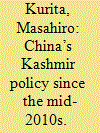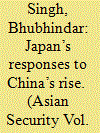|
|
|
Sort Order |
|
|
|
Items / Page
|
|
|
|
|
|
|
| Srl | Item |
| 1 |
ID:
188203


|
|
|
|
|
| Summary/Abstract |
China’s sea power has been a continual discussion among scholars and policymakers, specifically regarding the kind of maritime power China is about to develop. Many strategists assume that China has adopted the Mahanian approach of constructing a strong naval power through the control of major merchant sea-lanes and offshore bases. However, this assumption is problematic. Since the mid-2000s, many Chinese scholars and strategists have proposed various approaches to how China should become a strong maritime power using alternative methods. This article organizes these approaches into different schools of thought and examines how they are developed. After years of policy debate on sea power construction, Chinese academics and policy practitioners have agreed that China could develop its sea powers not just with a dominant navy, but also through an emphasis on the importance of domestic maritime governance and diplomatic coercion. This approach goes beyond any understanding of Mahanianism. These findings help to reveal new perspectives with which to understand China’s multidimensional sea power, especially the use of gray-zone strategy in the South China Sea in recent years.
|
|
|
|
|
|
|
|
|
|
|
|
|
|
|
|
| 2 |
ID:
188204


|
|
|
|
|
| Summary/Abstract |
Since the mid-2010s, China’s policy toward the Kashmir dispute between India and Pakistan has shifted away from its traditional contours, where Beijing distanced itself from the dispute and acted as a mere development partner in the Pakistan-controlled territory. Although the much-hyped China–Pakistan Economic Corridor itself did not significantly change the nature of China’s development and economic activities in Pakistan-administered Kashmir, after its launch in 2015, Beijing signaled its willingness to take a mediator role, conducted activities entailing the employment of the PLA in the area, and even nudged Islamabad to take steps that would affect the geographical scope of the Kashmir sovereignty question. Then, in the wake of India’s announcement of the abrogation of Article 370 of the Constitution and the reorganization of the state of Jammu and Kashmir in August 2019, China’s Kashmir policy further drifted away from its traditional line. References to the United Nations Security Council resolutions on Kashmir reemerged in China’s public statements and Beijing took diplomatic actions to support Pakistan’s bid to internationalize the Kashmir issue. As a result, China’s Kashmir policy has been turning into a serious source of friction in Sino–Indian relations.
|
|
|
|
|
|
|
|
|
|
|
|
|
|
|
|
| 3 |
ID:
188205


|
|
|
|
|
| Summary/Abstract |
This paper attempts to disentangle the concept of security by exploring the duality between state security and societal security in post-conflict North Waziristan, Pakistan. The conceptual explications are centered on the interrelation between state security and societal security, to assess the securitizing potentials of state and society, which impact the durability of post-conflict peace. The reconceptualization is steered through an empirical overemphasis on the state-led security practices for reconstructing post-conflict security in North Waziristan and the consequent provincial merger (FATA-KP merger) that followed. Simply put, this paper intertwines conceptual analysis with empirical observations on post-conflict state security and societal security in North Waziristan to illuminate the underlying causes of the 'contested' peace in the former tribal Agency. Although this discussion is context-driven, most of the analysis is applicable, mutatis mutandis, to analyze state security and societal security in post-conflict settings.
|
|
|
|
|
|
|
|
|
|
|
|
|
|
|
|
| 4 |
ID:
188201


|
|
|
|
|
| Summary/Abstract |
Japan’s threat perceptions toward China have hardened over the post-Cold War period. This led Tokyo to rely more on overt balancing strategies compared with engagement and hedging strategies. While hard balancing measures are widely discussed in the literature, little or no attention is paid to soft balancing. Though concerned about China’s strategic rise, Japan’s strategic options are limited by the entrenched normative constraints within the security policymaking structure. These conditions make soft balancing a critical and viable strategy for Japan. The prominence of soft balancing is illustrated by analyzing Japan’s response to China’s widening influence in Southeast Asia, primarily focusing on two areas – East Asian multilateralism and the South China Sea territorial disputes. Empirically, this paper offers a more nuanced analysis of Japan’s response to China’s strategic rise; and theoretically, explains the way Japan’s case strengthens the conceptual utility of soft balancing through the incorporation of a normative perspective.
|
|
|
|
|
|
|
|
|
|
|
|
|
|
|
|
| 5 |
ID:
188202


|
|
|
|
|
| Summary/Abstract |
Japan’s decision to convert two helicopter-carrying ships into fixed-wing aircraft carriers has generated criticism on two fronts. Military analysts question the military sense of carriers in the age of long-range precision missiles, while other domestic critics decry the move as a flagrant breach of Japan’s constitutional constraints on possessing senryoku (war potential) and one likely to provoke Japan’s neighbors, most notably China. Against this backdrop of criticism, why did the administration of Prime Minister Shinzo Abe take Japan back into the difficult business of carriers? This article argues that contrary to stated criticism, the carrier conversion program does provide Tokyo with tangible military benefits but these on their own are insufficient to explain the decision. Instead, we show the move is motivated in part by the desire to leverage carriers’ symbolic value for political ends.
|
|
|
|
|
|
|
|
|
|
|
|
|
|
|
|
|
|
|
|
|